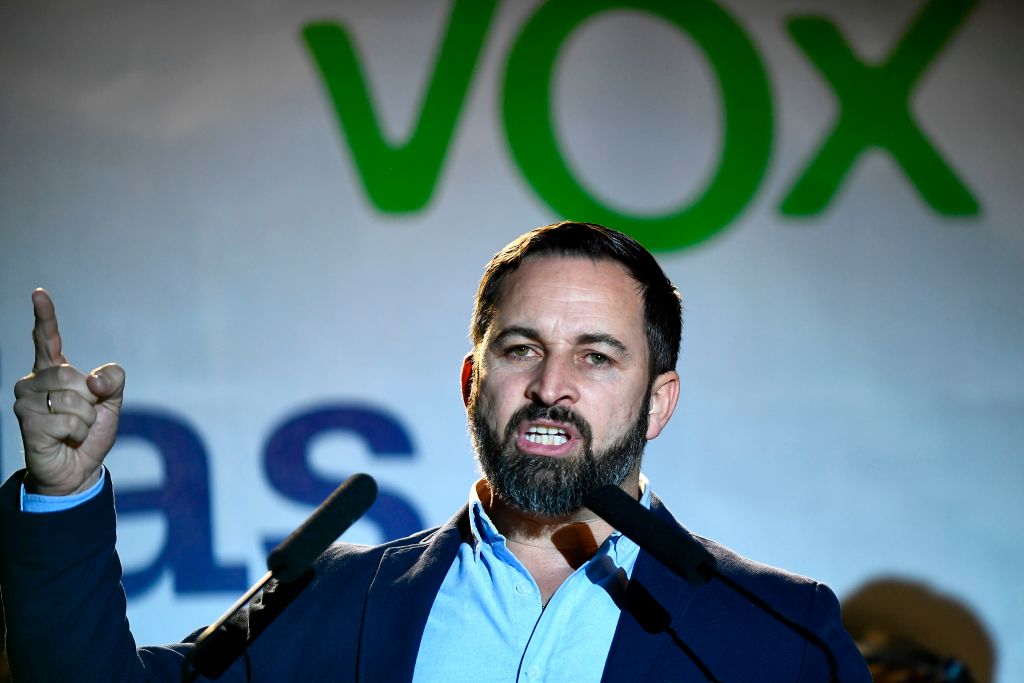Vox, the most right-wing of Spain’s mainstream political parties, has emerged considerably strengthened from Sunday’s local and regional elections. With the left-wing vote slumping badly, the Partido Popular, the largest right-wing party, also had an excellent night, but crucially it will need the support of Vox to govern in many regions and town halls.
These elections then suggest that Vox may be a highly influential (albeit junior) partner in the central government after the general election which, it has just been announced, will be held on 23 July. At present it is the third-strongest party in the national parliament with 52 of the 350 seats, while the Partido Popular is the second-strongest with 88 seats. These two right-wing parties already govern in coalition in the Castile-León region and if, as now seems likely, they can join forces in July to oust Spain’s fragile Socialist-led government, they doubtless will.
With a Partido Popular-Vox coalition in power, political life in Spain would be radically different. Both the present left-wing government and much of the mainstream media routinely refer to Vox as ‘la ultraderecha’ (the far right); during a recent parliamentary debate one minister described Vox as a ‘banda de fascistas’ (band of fascists). The staunchly conservative Vox defends the constitution, participates actively in the democratic process and can plausibly claim to have enriched Spain’s young democracy by representing people who previously didn’t vote because they felt no party spoke for them.
Vox is not fascist but it is always happy to challenge consensus. The party was founded in 2013 by fugitives from the Partido Popular disgusted by its meek compliance with the instruction from the European Court of Human Rights to release convicted Basque terrorists. Today, Vox remains committed to national sovereignty and is the most Eurosceptic party in this overwhelmingly Europhile country; during one parliamentary debate, Santiago Abascal, the party’s leader, criticised the European Union’s ‘Soviet pretensions’.
Vox also takes an uncompromising (the left say xenophobic) position on immigration, is strong on law and order, refreshingly anti-woke and unapologetically proud of Spain’s history, culture and traditional way of life – including hunting and bullfighting. The party is also highly critical of the wastage and unnecessary bureaucracy in Spain’s 17 regional governments, some of which have become nests of corruption. Above all, Vox proudly upholds traditional Catholic values: ‘the values of your father and your grandfather’.
A coalition with Vox, then, might help the Partido Popular decide what it really stands for. For many years the Partido Popular was the country’s only right-wing party, a broad church for free-market liberals, conservatives and erstwhile supporters of General Franco. But the emergence of Vox has caused something of an identity crisis for it. It tried ignoring Vox and it tried attacking Vox. It tried shifting to the centre and it tried shifting to the right, but it only really succeeded in looking shifty. Not surprisingly, Vox’s leaders have described the Partido Popular as the ‘derechita cobarde’ (the puny and cowardly right).
Perhaps voters also sense that governing in partnership with Vox might help the Partido Popular clean up its act. Over recent years it has been beset by a plethora of elaborate, interlocking scandals. Most Spaniards can no longer keep track of all the Partido Popular politicians accused of fraud, embezzlement and money-laundering. Maintaining, with breath-taking effrontery, that the frequency and extent of these corruption scandals proves that the great majority of Partido Popular politicians are in fact endearingly honest (‘Because, you see, it never even crosses our minds that such terrible things might be going on’) has not proved very reassuring.
One Partido Popular politician likely to welcome a regenerative coalition with Vox is Isabel Díaz Ayuso, the combative leader of the Madrid region. Her plain-speaking approach (‘When they call you a fascist you know you are on the right side of history’) helped her to another resounding victory on Sunday. Ayuso has frequently complained of the difficulty of running the Madrid region at a time when the central government is left-wing. Sunday’s election results suggest that she may get her wish for a genuinely right-wing national government in a few weeks’ time.






Comments